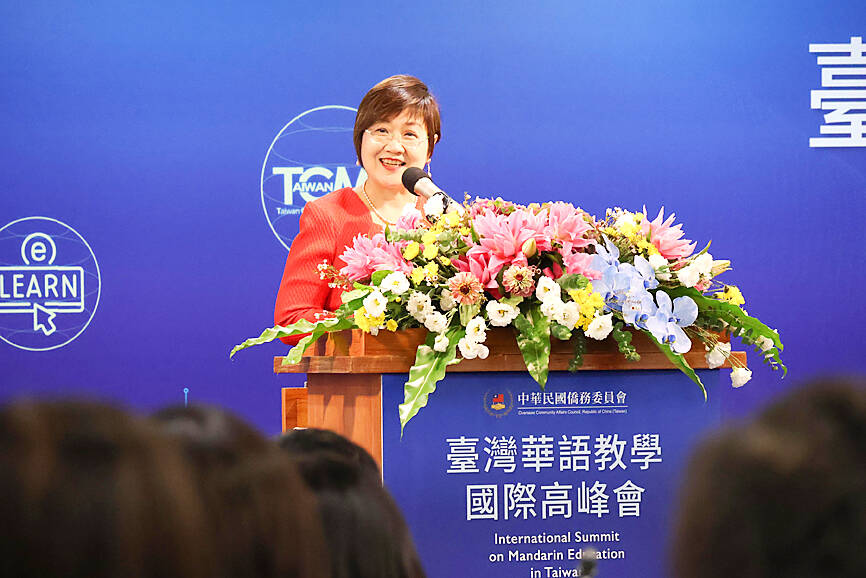The nation’s overseas Chinese-language learning programs are vital tools of diplomacy, high-ranking officials said on Tuesday at a summit on strategies for the Taiwan Centers for Mandarin Learning.
Language education experts, nearly 100 Chinese-language teachers and several diplomats attended the first day of the two-day event entitled International Summit on Mandarin Education in Taiwan at the Overseas Community Council in Taipei.
The council is considering a Web platform to enable Taiwanese Chinese-language teachers around the world to communicate and learn from the experiences of others, Overseas Community Affairs Council Minister Hsu Chia-ching (徐佳青) said.

Photo courtesy of the Overseas Community Affairs Council
The council hopes its investment in technology would bring together people from a diverse array of cultures and ethnicities, Hsu said, adding that the council’s mission is to burnish the international image of Taiwan’s Mandarin education.
Taiwan Centers of Mandarin Education has become a representation of the nation itself in many important ways, National Security Council Deputy Secretary-General Hsu Szu-chien (徐斯儉) said.
The nation should boost the number of centers without losing sight of program quality, which is more essential to success than the number of schools, he said.
Navigating the distinct education systems of foreign countries poses a significant challenge to educators working abroad, he said, adding that a multi-ministerial joint effort is key to overcoming problems.
The hard work put into the effort is already paying dividends and the agencies involved are to continue expanding its success, Hsu Szu-chien said.
The intergovernmental collaboration was prompted by the Ministry of Education’s Mandarin Education 2025 project, which must achieve its goals in one year, Deputy Minister of Education Lio Mon-chi (劉孟奇) said.
Taiwan’s Chinese-language education is an important part of the national strategy and the ministry aims to open language schools in countries targeted by the New Southbound Policy, even as it promotes collaborations with the US and Europe, Lio said.
Giving foreign-student status to people who took Chinese-language advanced placement classes was a breakthrough and the ministry hopes to recruit foreign students at their country of origin, he said.
American Institute in Taiwan Acting Deputy Chairman Richard Jao (饒昌明) learned Chinese in a doctoral program at Columbia University in New York under a passionate instructor from Taiwan, Lio said.
“Without him, I would not be here today,” Jao said in a remark addressed to educators in the audience. “You play an extremely important role.”

The Chinese military has built landing bridge ships designed to expand its amphibious options for a potential assault on Taiwan, but their combat effectiveness is limited due to their high vulnerability, a defense expert said in an analysis published on Monday. Shen Ming-shih (沈明室), a research fellow at the Institute for National Defense and Security Research, said that the deployment of such vessels as part of the Chinese People’s Liberation Army (PLA) Navy’s East Sea Fleet signals a strong focus on Taiwan. However, the ships are highly vulnerable to precision strikes, which means they could be destroyed before they achieve their intended

The Taiwan Experience Education Program (TEEP) has funded short-term internships in Taiwan for more than 4,500 young people from more than 40 countries since 2015, with the goal of attracting and retaining international talent, the Ministry of Education said yesterday. Fifty-five colleges launched 514 projects this year, including in fields such as semiconductors, artificial intelligence, medicine and biotechnology, green energy, and sustainability, it said. The program provides research and practical internships in Taiwan for two to six months, and offers cultural exchange and networking opportunities, the ministry said. For example, National Formosa University’s Embedded System and Autopilot Laboratory developed two solar-powered drones in

GLOBAL: Although Matsu has limited capacity for large numbers of domestic tourists, it would be a great high-end destination for international travelers, an official said Lienchiang County’s (Matsu) unique landscape and Cold War history give it great potential to be marketed as a destination for international travelers, Tourism Administration Director General Chen Yu-hsiu (陳玉秀) said at the weekend. Tourism officials traveled to the outlying island for the Matsu Biennial, an art festival that started on Friday to celebrate Matsu’s culture, history and landscape. Travelers to Matsu, which lies about 190km northwest of Taipei, must fly or take the state-run New Taima passenger ship. However, flights are often canceled during fog season from April to June. Chen spoke about her vision to promote Matsu as a tourist attraction in

Taipei resident Mu Chu-hua caught some glimpses of China’s mighty military parade on YouTube on Wednesday. As she watched hypersonic missiles roll down Beijing’s Changan Avenue and troops march in lockstep, she did not feel like they posed a threat to Taiwan. Mu, a 69-year-old retiree, said she saw the parade as simply a way for Chinese President Xi Jinping (習近平) to “say thank you to the troops.” “I thought it was quite normal,” she said. “It was very cool.” China’s military parade commemorating the end of World War II was being watched internationally for insights into Beijing’s military advances and its show